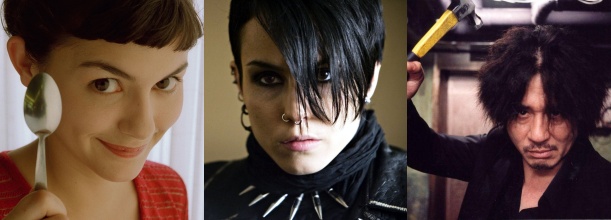World Cinema: A Rant

I’m not convinced that anyone in the English-speaking film industry really knows how to deal with foreign films. Often overlooked and badly marketed, they are hidden in the depths of dvd shops and sometimes even misleadingly advertised. As a result of constant mishandling, some great films, occasionally among the best in their genre, have been relegated to an obscure niche. I think I’ve narrowed down the main ways in which ‘world cinema’ is marginalised and misrepresented; read on and see the glorious, subtitley light.
STIGMAFICATION
Take for example, a hip Londoner (see below for examples). She wears tweed cardigans and oversized glasses with plain lenses, and when asked about her favourite kind of movies, she’ll guffaw: “Oh, you know, I like foreign films” as she throws paint at a canvas with a spatula.

But grouping foreign films films this way makes no sense; if someone asked you what your favourite type of music was, would you reply “anything by bands beginning with the letter N”? No, because that would be ridiculous, and would also include rubbish bands like Nickelback. In reality it’s just laziness that causes us to lump all foreign language films together, as though the plot of the film doesn’t matter because everyone talks weird in it anyway.
ENGLISHIFICATION
Perhaps as a result of the stigma attached to World Cinema, studios never quite seem to know where to pitch their foreign films, occasionally attempting to direct at the mainstream, but never getting it quite right. For example, following the success of the Stieg Thingy’s Millennium Trilogy in the publishing world, Män Som Hatar Kvinnor (what do you mean you don’t speak Swedish?) was given a wide UK release. Watch the trailer.
Did you spot it? That’s right, it’s all in English. A bit strange, you might think, since all the movie’s dialogue is in Swedish; and it seemed to be a fairly cynical ploy to lure subtitle-phobic audiences into the cinema. While falling for this trick may sometimes mean you end up seeing a very good Swedish thriller like The Girl with the Dragon Tattoo, you could end up watching a sombre French film in which Juliette Binoche stares out of a rainsoaked window for an hour and a half.

This isn’t all just hypothetical scenarios though, as I recently became a victim of this devilish trickery myself when I bought a film called Days Of Glory (macho stars above). I hadn’t seen it, and thanks to the trailer, title, blurb, and entire packaging, had no reason to believe it was in anything other than English, (except perhaps for the actors’ names and a small box saying ‘French’, but I’m not made of eyes) and was a bit surprised to discover it was, in fact, in French. I’m not complaining, since it turned out to be a good film, but was dismayed at the lengths companies will go to in order to pretend their film’s as English as lager and sunburn.
GENREFICATION
Despite the fact that world cinema shouldn’t be treated as a genre (see above for compelling argument), most shops seem to treat it as one and, just as we have ‘Western’ and ‘Romance’ sections, we also have a ‘World Cinema’ section, into which is crammed every different type of subtitled film, from South Korean thriller JSA, to Kristof…Krys…Krzysztof (I googled it) Kieslowski’s head-scratching Three Colours Trilogy.
In my local shop, bemused copies of Downfall sit next to La Vie En Rose which sit next to JCVD – (apparently they’re not good at alphabetising either). Take a look at this trailer for the latter flick and see which genre jumps out at you first:
Did you think “Gosh, look at that prime example of world cinema”? Did you bollocks. The makers of JCVD set out to make a good action film, so why don’t we see it as that? A good action film, which also happens to be in French.
CONCLUSIONIFICATION
In my ideal world, foreign films would be properly labeled and marketed, it would be illegal for tall girls to wear high heels, and the Girl With The Dragon Tattoo would have been advertised as a gripping Swedish thriller, rather than have its origin ignored completely. People would also see subtitled films as mainstream entertainment, not kept to the dark recesses of HMV or independent cinemas, but more widely available, so we could more easily get to see how talented the rest of the world is.

From South Korean thrillers to French heist movies, from Mexican gangster films to German pornography – the list is endless. Don’t be put off by the subtitles, grow a pair (of eyes) and enjoy films which are, quite often, better than a lot of English language releases. I’m looking at you, Transformers.





Recent Comments